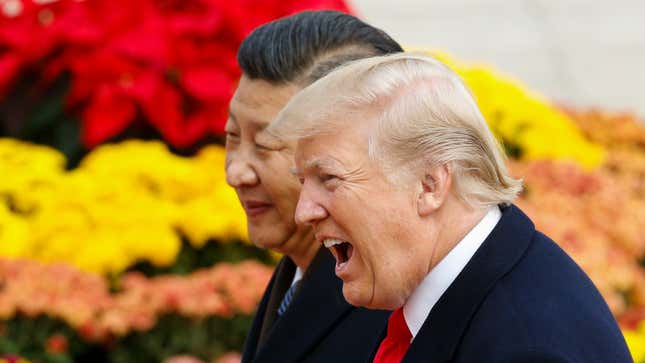
The Trump administration has another Chinese technology company on its radar: the Semiconductor Manufacturing International Corporation, the country’s biggest chip maker. And as you all can imagine if you’ve been following the recent news cycle, that is not good for SMIC.
On Friday, the U.S. Department of Commerce informed American companies in the chip industry of new restrictions on exports to SMIC, the Financial Times reported. Now, American companies must obtain licenses from the government in order to sell products, such as software and chip-making equipment, to SMIC.
In a letter communicating the new restrictions to U.S. companies, the Commerce Department said that it had taken action because exports to SMIC posed an “unacceptable risk” of potentially being used for military purposes.
According to U.S. government sources quoted by the Times, the Pentagon made the proposal to restrict SMIC because it was worried that the company was enabling the technological advancement of China’s military.
In a statement to Reuters, SMIC said it had not received any official notice of the U.S. restrictions and that it does not have ties to the Chinese military.
“SMIC reiterates that it manufactures semiconductors and provides services solely for civilian and commercial end-users and end-uses,” it said. “The Company has no relationship with the Chinese military and does not manufacture for any military end-users or end-uses.”
But although SMIC faces new restrictions, it is not yet on the entity list, which essentially functions as the Commerce Department’s blacklist. Companies on the entity list are banned from using U.S.-made tech in their devices. This, per Reuters, makes it difficult to get any export license approved.
The Commerce Department’s Bureau of Industry and Security, which controls the export of commodities and related technology that could compromise U.S. national security, declined to comment on the SMIC restrictions in a statement to Reuters. However, it said that it was “constantly monitoring and assessing any potential threats to U.S. national security and foreign policy interests.”
The new restrictions are yet another blow to SMIC, which had already been affected by U.S. sanctions on Huawei, its top customer. Unlike SMIC, Huawei was added to the entity list in 2019.
Huawei chairman Guo Ping said this month that U.S. sanctions had brought “great challenges” to the company’s production and operations. The restrictions have hit Huawei’s smartphone division especially hard, and the company said it would stop manufacturing its Kirin chip, one of its most advanced processors, beginning on Sept. 15. The Kirin chips power Huawei’s high-end phones. The Times reports that the new restrictions will also affect U.S. chip designer Qualcomm, which uses SMIC to manufacture some of its chips.
The move is the latest in the U.S.-China tech feud that has especially intensified over the past few months. In case you need a reminder, the Trump administration has tried to ban the video-sharing app TikTok and force its Chinese owner, ByteDance, to sell the U.S. division to an American company. It has also tried to ban the messaging app WeChat until a judge said hold your horses.
China hasn’t taken all of this sitting down. It has reportedly said that it prefers TikTok to be shut down in the U.S. instead of authorizing the forced sale of the app to an American company. The country has also been working on its own version of a blacklist, or an “unreliable entity” list, that could bar certain foreign companies from importing, exporting or investing in the country.